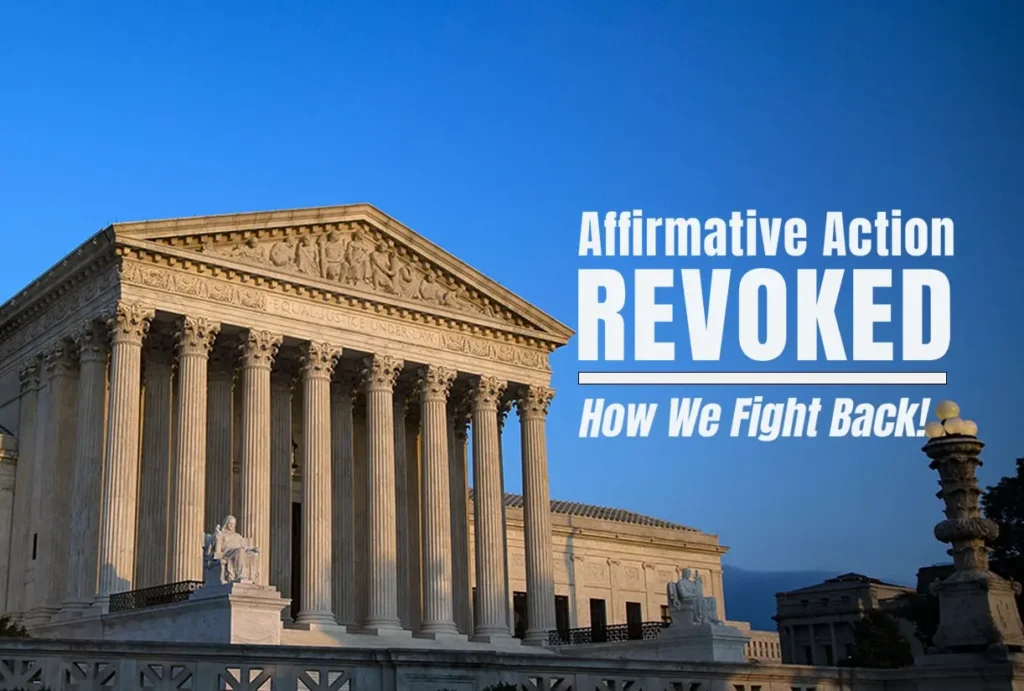On June 29, 2023, the United States Supreme Court struck down race based affirmative action in college admissions. What does this mean and importantly, what can we do about it? Here are 4 ways we can fight back!
Before we jump into current events, let’s look at the history of Affirmative Action. In 1961, Kennedy signed Executive Order 10925, establishing the President’s Committee on Equal Employment Opportunity and requiring federal contractors to “take affirmative action to ensure that applicants are employed, and that employees are treated during employment, without regard to their race, creed, color or national origin.” President Lyndon B. Johnson cemented the connection with his own, more expansive, executive order. Over time, the term took hold in education as well, spurred on by the Civil Rights Movement.
These same rules were extended to provide equal opportunities to minority groups, especially people of color and women. Eventually, these same affirmative action practices would become a key component in the college admissions process.
Director of Teacher Preparation & Innovation at Rutgers University, Dr. LaChan Hannon, believes that the Supreme Court decision could have such a powerful effect on how much access we have to higher education, it could limit future generation’s ability to build #GenerationalWealth. Others, like President of Delaware State University, Dr. Tony Allen, believe that this decision “will draw a greater number of talented students of color” to Historically Black Colleges and Universities (HBCU) across the country. Although the decision may not be the reason HBCU’s want to see an increase in enrollment, it’s still great to see!
As the job market is largely influenced by educational outcomes, this action may have consequences on the racial makeup of America’s workforce. Jessica Gyunn of USA Today reports that “Observers expect the ruling to embolden attacks on corporate diversity, equity and inclusion initiatives” even though few employers engage in the same type of affirmative action policies that colleges and universities use. Christy Kiely, a labor and employment partner with law firm Seyfarth, explains that employers simply think of affirmative action as “[creating] an environment that is welcoming and fair to all workers and that encourages diverse candidates to apply for positions,” but because the new ruling may affect how many students of color have access to college level education, it may affect on how much color we see in the workplace years down the line. A study presented by The Upshot disproves the idea that beneficiaries of affirmative action do worse than students who would be admitted without it. In fact, beneficiaries of affirmative action complete their degree at higher rates and earn almost as much as any other student post-graduation.
1. Support HBCUs
For starters, we can help uplift HBCUs during this time by showing our support financially, especially when they may start seeing an unprecedented amount of applications because of this affirmative action ruling. Now, more than ever, it will be important to show love to Historically Black Colleges & Universities. Whether it’s through the Thurgood Marshall College Fund, the United Negro College Fund, or directly through their school website, support the schools uplifting our youth.
2. Empower Our Youth to Soar
Encourage young, Black students to apply to their dream colleges. Whether their dream college is an HBCU or even another college or university, younger generations need to know that despite the Supreme Court decision, their dreams of going to an elite university are still achievable.
3. Apply Pressure.
Put pressure on universities to implement other policies so diversity doesn’t decline. Although it may not be ideal, the Supreme Court did say that race can still be mentioned in college essays. To make up for the decision, colleges might also start considering other factors like socioeconomic status, first-generation status, increased recruiting at underrepresented schools and much more to keep their diversity numbers steady. We need to make sure that universities know that these types of policies aren’t just a want—they are a NEED going forward.
4. VOTE!
The politicians we vote into office are the ones appointing supreme court justices. If we want different decisions, we must vote and make sure we put people that we trust into office. Make your voice heard in both the general election and your state elections is vital. Every vote really does count. For voting resources visit: https://vote.gov/
While the decision may be discouraging, it is not a reason to stop fighting. If anything, it should be a sign to move forward more united than ever towards one goal: taking the right steps to build #GenerationalWealth in our community!


















